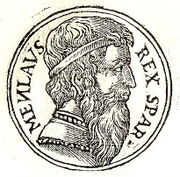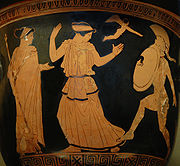Menelaus


In Greek mythology, Menelaus (Ancient Greek: Μενέλαος) was a legendary king of Mycenaean (pre-Dorian) Sparta, the husband of Helen, and a central figure in the Trojan War. He was the son of Atreus and Aerope, and brother of Agamemnon king of Mycenae and leader of the Greek army during the War. Prominent in both the Iliad and Odyssey, Menelaus was also popular in Greek vase painting and Greek tragedy; the latter more as a hero of the Trojan War than as a member of the doomed House of Atreus.
Contents |
Ascension and reign
Sources for the early life of Menelaus are quite late, post-dating 5th-century BC Greek tragedy.[1] According to these sources, Menelaus' father Atreus had been feuding with his brother Thyestes over the throne of Mycenae. After a back-and-forth struggle that featured adultery, incest and cannibalism, Thyestes gained the throne after his son Aegisthus murdered Atreus. As a result, Atreus’ sons, Menelaus and Agamemnon, went into exile. They first stayed with King Polyphides of Sicyon, and later with King Oeneus of Calydon. But when they thought the time was ripe to dethrone Mycenae's hostile ruler, they returned. Assisted by King Tyndareus of Sparta, they drove Thyestes away, and Agamemnon took the throne for himself.
When it was time for Tyndareus' daughter Helen to marry, many Greek kings and princes came to seek her hand, or sent emissaries to do so on their behalf. Among the contenders were Odysseus, Menestheus, Ajax the Great, Patroclus, and Idomeneus. Most offered opulent gifts to win Tyndareus' favor. But Tyndareus would accept none of the gifts, nor would he send any of the suitors away for fear of offending them and giving grounds for a quarrel. Odysseus promised to solve the problem in a satisfactory manner if Tyndareus would support him in his courting of Penelope, the daughter of Icarius. Tyndareus readily agreed, and Odysseus proposed that, before the decision was made, all the suitors should swear a most solemn oath to defend the chosen husband in any quarrel. Then it was decreed that straws were to be drawn for Helen's hand. The suitor who won was Menelaus. This stratagem succeeded, the rest of the Greek kings swearing their oaths, and Helen and Menelaus were married. Following Tyndareus' death, Menelaus became king of Sparta because the only male heirs, Castor and Polydeuces, had died when they had ascended Mount Olympus. Together, Menelaus and Helen had only one daughter, Hermione.
Trojan War
In a return for awarding her a golden apple inscribed "to the fairest," Aphrodite promised Paris the most beautiful woman in the world—Helen.[2] After concluding a diplomatic mission to Sparta, Paris absconded to Troy with Helen in tow despite his brother Hector forbidding her to depart with them. Invoking the oath of Tyndareus, Menelaus and Agamemnon raised a fleet of one thousand ships according to legend and went to Troy to secure Helen's return; the Trojans were recalcitrant, providing a casus belli for the Trojan War.
Homer's Iliad is the most expansive source for Menelaus' exploits during the Trojan War. In Book 3, Menelaus challenges Paris to a duel for Helen's return. Menelaus soundly beats Paris, but before he can kill him and claim victory Aphrodite spirits Paris away inside the walls of Troy. In Book 4, while the Greeks and Trojans squabble over the duel's winner, Athena inspires the Trojan Pandarus to kill Menelaus with his bow and arrow. Menelaus is wounded in the abdomen, and the fighting resumes. Later in Book 17, Homer gives Menelaus an extended aristeia as the hero retrieves the corpse of Patroclus from the battlefield.
According to Hyginus, Menelaus killed eight men in the war, and was one of the Greeks hidden inside the Trojan Horse. During the sack of Troy, Menelaus killed Deiphobus, who had married Helen after the death of Paris. While looking for Helen, Menelaus resolved to kill her; Euripides tells us that when he found her, however, her striking beauty prompted him to drop his sword and take her back.[3]
After the war
The Odyssey Book 4 provides an account of Menelaus' return from Troy and his homelife in Sparta. When visited by Odysseus' son Telemachus, Menelaus recounts his voyage home. As happened to many Greeks, Menelaus' ship was blown off course. While stranded in Egypt, Menelaus learned from Proteus how he could return home. After their homecoming, Menelaus and Helen's marriage is strained; Menelaus continually revisits the human cost of the Trojan War, particularly in light of the fact that Helen could not provide him a male heir. According to Euripides' Helen, after death Menelaus was reunited with Helen on the Isle of the Blessed.[4]
Menelaus in vase painting
Menelaus appears in Greek vase painting in the 6th to 4th centuries BC, such as: Menelaus' reception of Paris at Sparta; his retrieval of Patroclus' corpse; and his reunion with Helen.[5]
Menelaus in Greek tragedy
Menelaus appears as a character in a number of 5th-century Greek tragedies: Sophocles' Ajax, and Euripides' Andromache, Helen, Orestes, Iphigenia at Aulis, and The Trojan Women.
In other media
- Menelaus is portrayed by Niall MacGinnis in the 1956 film Helen of Troy
- In the Coen Brothers' O Brother, Where Art Thou?, which is loosely based on Homer's Odyssey, Academy Award nominated actor Charles Durning plays Governor Menelaus 'Pappy' O'Daniel.
- A more faithful and sympathetic portrayal is presented by James Callis in the 2003 miniseries Helen of Troy
- Menelaus also appears in the 2004 film Troy, portrayed by Brendan Gleeson. Like the 1957 film that influenced it, Menelaus is portrayed as a brutish king out for revenge. He duels Paris and wins, but Paris retreats to his brother, Hector. When Menelaus wants to strike the finishing blow, Hector kills him to protect his brother.
- Menelaus is a character in John Barth's short story, "Menelaiad" which is part of Lost in the Funhouse
See also
Notes
|
||||||||
|
|||||